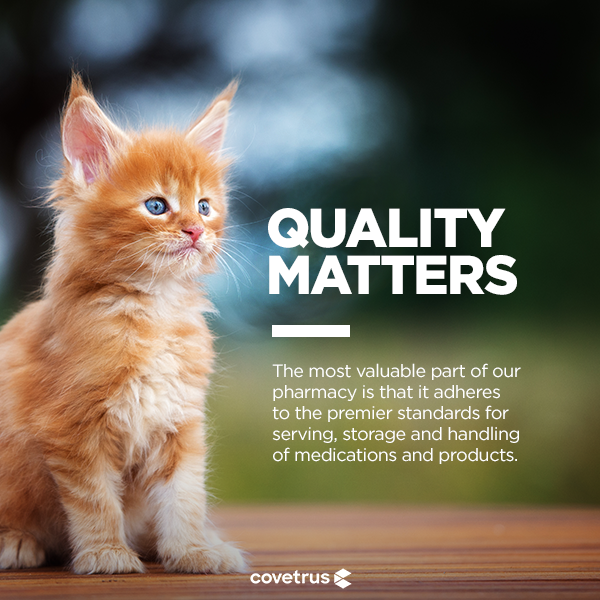Covetrus, our online pharmacy, is a trusted source of highest quality food, parasite protection, and medication for your favorite felines!
Experience the GOLD Cat Friendly Practice difference!
We've created a feline-friendly environment and made veterinary visits more cat-friendly!
Check out important reasons to visit a Cat Friendly Practice®: catfriendly.com/choose-cfp.
30 Years!
Happy Anniversary to Dr. Ellison and the Cat Hospital of Fairfax, Inc. The Hospital will celebrate 30 years of service to the Fairfax feline community as of 27 August 2021. Congratulations Dr. Ellison.
Covid-19
American Veterinary Medical Association (AVMA)
“At this time, there is no evidence SARS-CoV-2, the virus that causes COVID-19, can spread to people from the skin or fur of pets,” says AVMA president John Howe, DVM. “So, there is no reason you need to wipe down leashes or your pet after returning from a walk, unless your pet or its collar/leash has become soiled.
“Irrespective of COVID-19, you should be practicing good hygiene during interactions with your pet, including washing your hands before and after handling your pet or its food, supplies, and waste, and keeping your pet clean and its food, water, and bedding fresh.”
Read more from the AVMA:
Cornell Feline Health Center
Coronavirus update: While this evolving situation might seem frightening, please remember: There is currently no definitive evidence that either cats or dogs can transmit COVID-19 to humans.
“As we continue to learn more, it’s important to note that since cats and dogs are mammals, the possibility of human-to-cat transmission, and vice versa, does technically exist.
For this reason, anyone diagnosed with COVID-19 should limit their contact with their pets, and wash their hands before and after interacting with them, which includes cleaning their litter boxes.
If you notice your pet experiencing respiratory illness or fever, we recommend (out of an abundance of caution) to quarantine them, wash your hands carefully before and after handling them, and contact a veterinarian immediately to consult about best next steps.
It is very important that cat owners understand that the current situation warrants caution, but that they should not seek COVID-19 testing for their cats, given the shortage of tests available for humans. It’s also important to point out that currently available information suggests that if precautions are taken, the likelihood of cats becoming infected and of them serving as a source of COVID-19 infection is believed to be very low.”
International Cat Care
Rabies
An important reminder for cat owners and cats is that Rabies is a human health concern, NOT just an animal health concern. All pets should be immunized for this fatal disease. For cats that never really go outside, the risk is low but NOT zero. The Virginia Sate Veterinary Epidemiologist, Dr. Darby, relayed that it is not uncommon for bats to get into homes. These have the potential to carry and spread the deadly Rabies virus, and, she adds, that almost daily there is one that tests positive for Rabies.
See information from the Fairfax County Department of Health regarding rabies at https://www.fairfaxcounty.gov/health/rabies .
Heartworm prevention
Fleas and ticks are not the only pests from which your cat needs to be protected. Mosquito bites can transmit parasites - such as heartworms. And because you can’t see heartworms, testing is the only way to be sure your cat is clear of infection. See the information links below from the American Heartworm Society for more information:
Dr E recommends!
To keep informed of pet nutrition concerns such as pathogens and inappropriate or unhealthy levels of nutrients; see www.petnutritionalliance.org.
Arthritis - Degenerative Joint Disease
From the American Association of Feline Practitioners, see more information:
https://catfriendly.com/feline-diseases/degenerative-joint-disease-arthritis/
Pet nutrition
December 6th, 2017 from 6 to 7:30pm Baker Pet Talks: Tips from Cornell Experts - Joseph Wakshlag. The public is invited to watch this webinar with tips on combat pet obesity. Watch online at http://www.vet.cornell.edu/FHC/about/FHC_Updates/PetNutritionBakerPetTalks.cfm.
Pests
Cats, fleas and ticks
Even if your cat stays indoors, she can still be at risk for parasites. Fleas, ticks, and mosquitoes can hitch a ride into your house with any human or other pet. External parasites such as fleas and ticks may be easier to spot, but their bites, and those of mosquitoes, can also introduce internal parasites. Bite prevention is the best way to avoid parasite transmitted diseases and can be as simple as a monthly topical application or a collar. Read more at: Parasite Prevention from the American Association of Feline Practitioners.
http://catfriendly.com/keep-your-cat-healthy/parasite-prevention/
And remember, we may think more about parasites in the summer, but they are year-round pests!
=^..^=
All pet food recalls
The US Department of Agriculture maintains a list on its web site of all pet food recalls: view the link here: http://www.fda.gov/animalveterinary/safetyhealth/recallswithdrawals/
Wellness Cat Food Recall
WELLNESS CANNED CAT FOOD VOLUNTARY RECALL
(does NOT include Wellness Core)
· All recalled items are 12.5 oz cans
· Cans printed with August 4, 2018 best buy dates in these flavors:
o Chicken
o Chicken and Herring
o Chicken and Lobster flavors
· Cans printed with August 5, 2018 best buy dates in these flavors:
o Turkey
o Turkey and Salmon
o Beef and Chicken
o Beef and Salmon
If you have any of these items, email info@wellpet.com or call 1-877-224-9587
The Cat Hospital 25th Anniversary Celebration
To The Cat Hospital Family: It is hard to believe that it has been 25 years at The Cat Hospital since I started my dream of a feline medicine practice. I was!! surprised !! by our staff and clients with a 25th Year celebration. I am very touched, and so appreciate all of you taking the time to honor my work.I received many thank you wishes and notes and I am grateful to you for trusting me with your precious companions. It is by no means a one way street; I have and will continue to learn an enormous amount from all of you. Sincerest Thanks.
Therapeutic laser treatment
Although more research is needed, many veterinarians are seeing effective improvement after therapeutic laser treatment in cats. More cat owners need to watch for displays of pain or mobility problems, especially since cats are very adept at hiding their pain or discomfort, and check their observations with their regular vet. Therapeutic lasers (very different from surgical lasers) operate at low-levels to “painlessly penetrate below the skin to help in healing.” Many benefits for cats include improvement in wound healing; sprains or strains in muscles, ligaments, and tendons; arthritis and degenerative disc and joint disease; post-surgical trauma; hip dysplasia; and inflammation.
“Why Fewer Cats Have Laser Therapy”. Cat Watch 20(3) 1, 6-7. March 2016. Cornell University, College of Veterinary Medicine Feline Heath Center. http://www.catwatchnewsletter.com/issues/20_3/features/Why-Fewer-Cats-Have-Laser-Therapy_141519-1.html
Contact the Cat Hospital of Fairfax, Inc. to discuss therapeutic laser treatment for your cat’s pain. This service has been offered for about two years now and several clients have reported positive feedback for their cat post-treatment.
Oral health and your cat
Brushing your pet’s teeth is the single most effective means to maintain dental health between professional dental cleanings. This 5-minute video gives easy, step-by-step instructions on how to teach a dog or cat to accept a daily tooth brushing: https://www.youtube.com/watch?v=wB3GIAgrTPE
February is Pet Dental Health Month
Dental health is a huge part of your pet’s overall health. Dental problems can cause, or be caused by, other health problems, which is why annual dental exams are so important for your pet. See video and printed information from the American Veterinary Medical Association:
https://www.avma.org/public/PetCare/Pages/Pet-Dental-Care.aspx
Anesthesia?
FDA Pet Food Recalls
Click here to link to the latest information on pet foods recalled by the U.S. Food and Drug Administration: http://www.fda.gov/AnimalVeterinary/SafetyHealth/RecallsWithdrawals/default.htm
Pet Safe Fruits and Veggies
GOOD to share:
+ Apples
+ Broccoli
+ Cantaloupe
+ Carrots
+ Green Beans
+ Squash
+ Strawberries
OFF limits for pets:
- Avocados
- Figs
- Garlic
- Grapes
- Onions
- Raisins
- Scallions
For more info: https://www.aspca.org/pet-care/animal-poison-control/people-foods-avoid-feeding-your-pets and http://www.aspcapetinsurance.com/101
Pet Heath Care Insurance / Assistance
ASPCA Pet Health Insurance (888) 716-1203
Care Credit (800) 677-0718
Embrace Pet Insurance (800) 226-1308
Nationwide (formerly VPI) (888) 899-4874
Trupanion (855) 491-3024
The Cat Hospital of Fairfax, Inc. does not endorse or prefer one group over another.
This list is provided for consumer information only.



